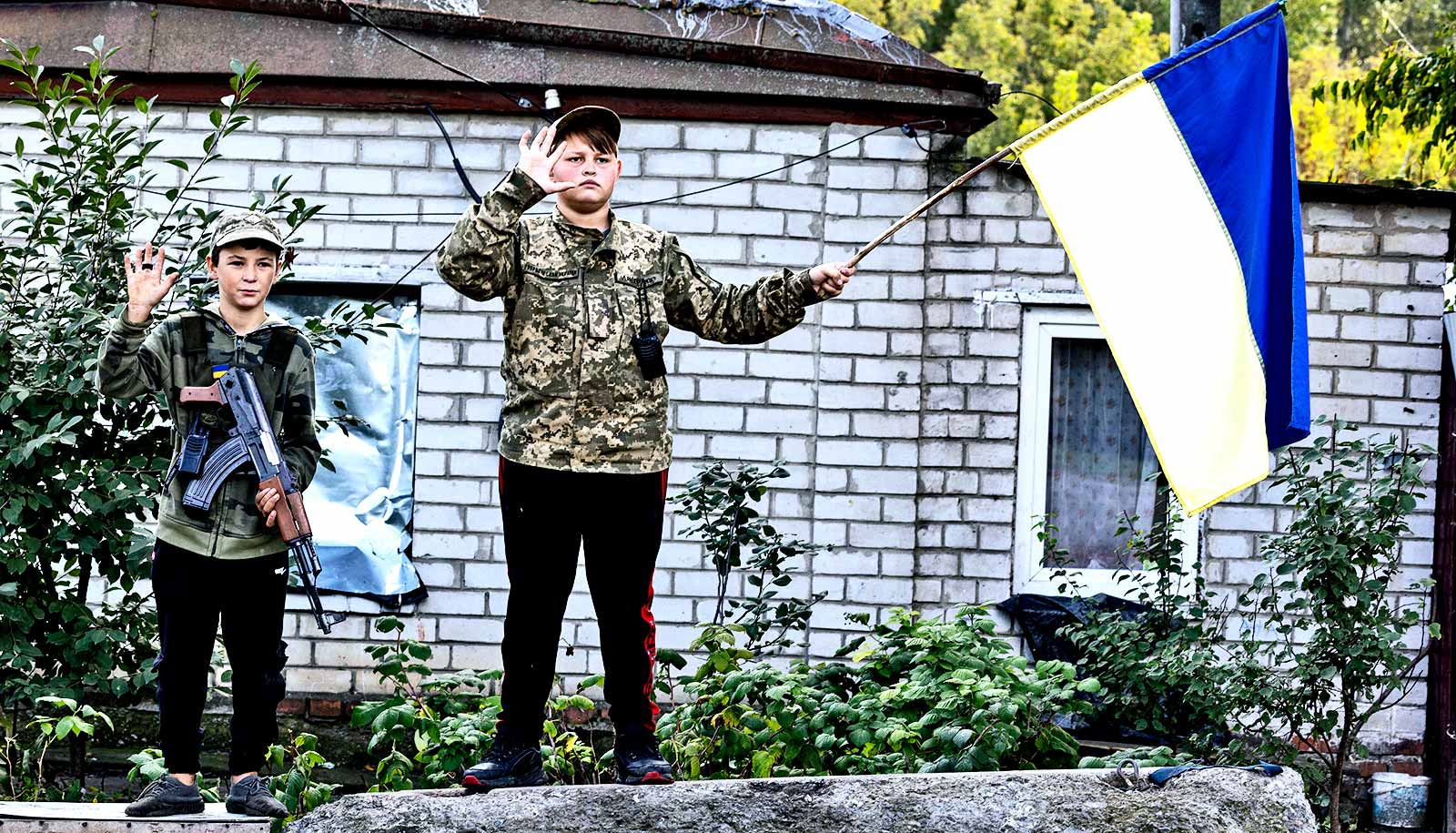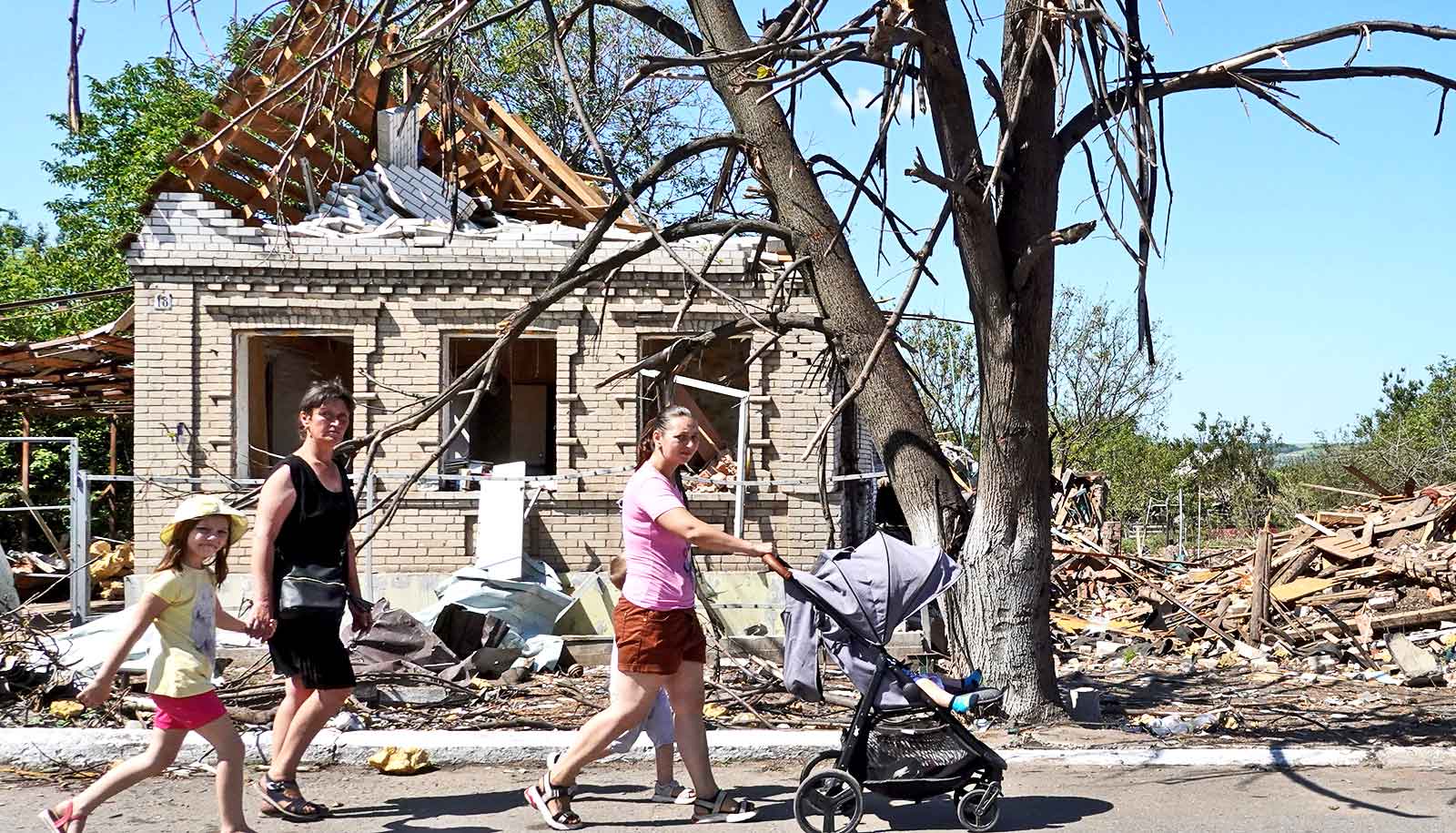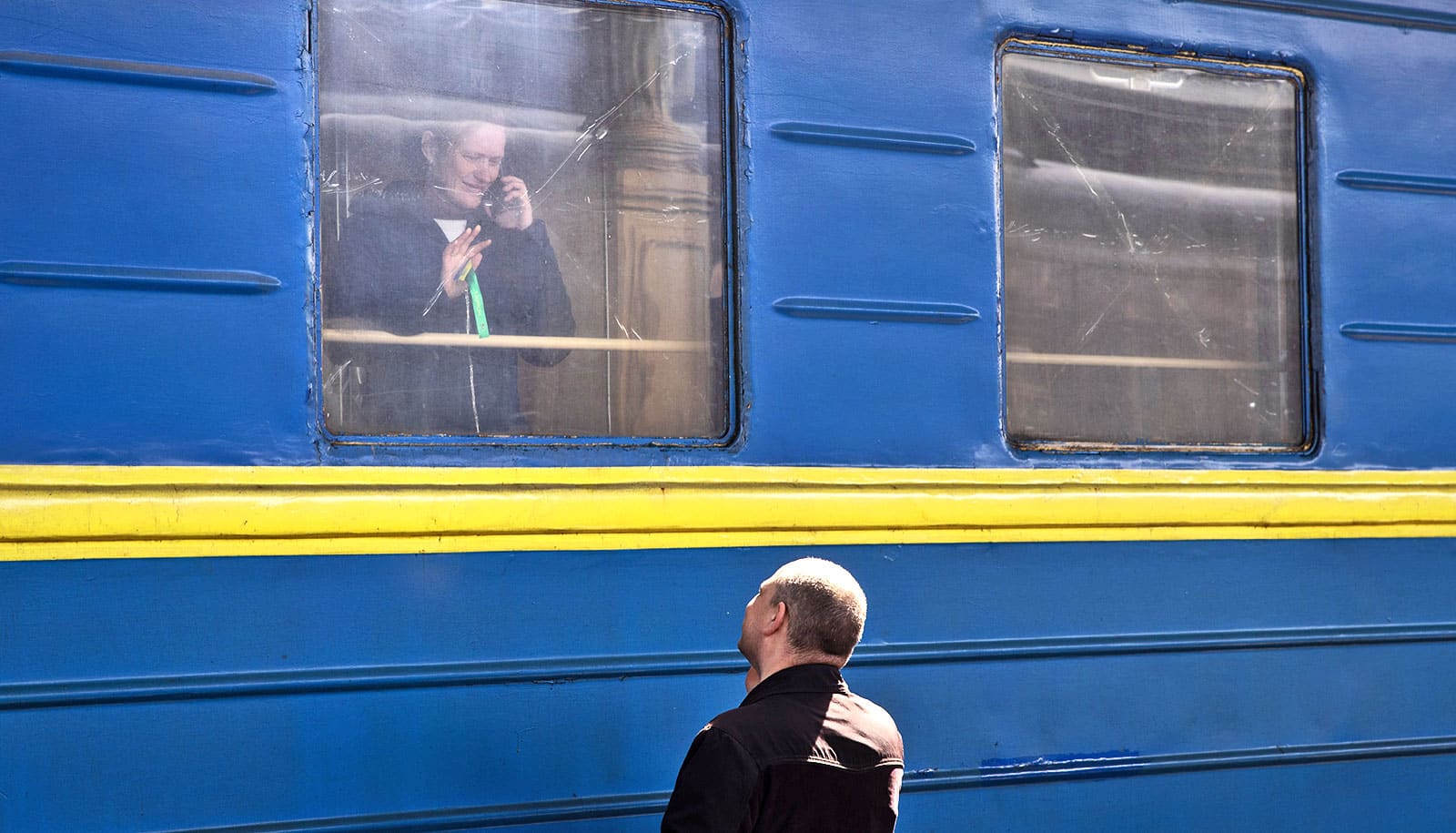The hasty withdrawal of Russian troops from northeastern Ukraine is by no means signaling the last stretch of the war, says Hein Goemans.
Goemans, a professor of political science at the University of Rochester, is an expert on international conflicts—on how they begin and how they may end.
“Most people believe that if one side wins a battle or a campaign, peace becomes more likely,” says Goemans, author of War and Punishment: The Causes of War Termination and the First World War (Princeton University Press, 2000) and coauthor of Leaders and International Conflict (Cambridge University Press, 2011).
But that’s not true. “If I fight a war with you and do poorly—but expected to do poorly in the hopes that the next battle will go better for me—then I’m not going to change my war aims. Only if something unexpected happens, would I change my expectations and my strategy.”
Likewise, Putin’s sham referenda in occupied territories and his calls for a cease-fire do not make peace now any more likely, Goemans says. “He’ll propose a deal that the Ukrainians or the West cannot accept; and the Ukrainians will propose a deal that he cannot accept. That’s for domestic consumption in Russia; he’s just posturing.”
Here, Goemans discusses “massive consequences” for Europe, worst-case scenarios, the outlook for peace, and what makes Putin so dangerous:
Russian forces hastily retreated in mid-September from Ukraine’s Kharkiv region, in the northeast. Is that possibly signaling the end of the war?
While unexpected, this Ukrainian battle victory is not the beginning of the end of the war.
No, it’s not the beginning of the end, but it was unexpected. Individual victories or defeats in a specific battle are often mistakenly read as indicating a change in the likelihood of war termination. Instead, what matters most is whether and how expectations on both sides change. And in this case, clearly Russian expectations of a swift victory have changed.
The proof is in the conscription of 300,000 more Russian men, some reportedly without any military training or experience. Russia, I think, has become more pessimistic about getting its original war aims fulfilled. But you don’t just kill the enemy and that’s that. You need the opponents to change their mind.
On the other hand, Ukraine has perhaps become more optimistic. If that is true, the key point to realize is that the gap between the minimal demands may not have decreased at all. While the terms may have shifted in Ukraine’s favor, both parties may well be as far apart as they had been before.
How do expectations affect war strategy and the likelihood of peace?
A change in expectations is often more important than a single battle or campaign victory.
Most people think that if you win a battle or a campaign, peace becomes more likely because the other side is defeated, and they recognize that they are defeated, which makes them more willing to make a deal.
But that’s not the right way to look at it. A change in expectations is often more important than a single battle or campaign victory. Because if I fight a war or battle with you and do poorly—but expected to do poorly in the hopes that the next battle will go better for me—then I’m not going to change my war game. Only if something unexpected happened, would I change my expectations and my strategy. That’s the fundamental thing. You could sustain a military defeat and still get a better deal.
A good example is the Yom Kippur War of 1974. The attacking Egyptian army was drastically defeated by the Israelis. Yet the Egyptians got the Sinai back. You ask—how is that possible?
Well, it’s because the Egyptian army showed that they were able to cross the Suez Canal and with it all the booby traps and barricades that Israel had built on the Suez Canal. They showed themselves a lot more competent than the Israelis had thought after 1967. So, you have this weird case where militarily Egypt lost, and still, the Egyptians got a better deal in the end, which was clearly not a military outcome. What happened was a change in expectations.
What do you make of Putin’s calls for a cease-fire? Do the latest sham referenda in the Kherson and Zaporizhzhia regions in the south, and in the pro-Russian, separatist “republics” in Luhansk and Donetsk in eastern Ukraine make a faster end to the war more likely?
Neither is likely to speed up a cease-fire.
No. I still expect the war to last at least another year, maybe two. Both sides still have plans and ideas to test before their expectations are likely to converge.
On Putin’s side, he may still expect Europe’s unity to crumble and try to force Ukraine to lower its minimum demands, especially if he can freeze them over the winter as a result of the lack of Russian natural gas. He’ll propose a deal that the Ukrainians or the West cannot accept; and the Ukrainians will propose a deal that he cannot accept. That’s for domestic consumption in Russia; he’s just posturing.
I’m not a foreign policy expert, but he probably does this because his massive mobilization is deeply unpopular among the Russian people. He has to find a way to say to his domestic audience something along the lines of, “I have to do this. My hands are forced. I’m trying honestly to make peace so it’s not my fault. It’s the fault of the ‘evil Ukrainian Nazis.”’
Ultimately, I think Putin’s trying to strengthen his bargaining position with the sham referenda and illegal annexations. If it had been a fair referendum under United Nations’ supervision—that might have had an effect. But not like this. I mean—voting was held with guards with machine guns at the polling stations and we’ve seen reports of men with guns at people’s doors, forcing Ukrainians to fill out ballots while being watched. That sends a clear message.
War termination—so the theory goes—is about finding the thing what makes both sides agree to stop fighting. How does that work?
Essentially, one side must get the other to change their mind and to convince them that striking a deal now is better than to continue fighting. It’s the best explanation we have so far. But it’s not satisfying.
Generally speaking, war provides information and shows the truth—the opponent’s cards—because there’s no more bluffing. We learn things about our opponent that we wouldn’t have known had we not fought.
You can see your foe’s true strength on the battlefield: whose forces are stronger, how good are their tanks, how capable are their generals—all that becomes public knowledge. That’s the prerequisite for peace; you can strike a deal because both sides now know the truth.
That’s the theory, at least. But I’ve come to see that intuitive kind of view as insufficient.
We know that some leaders continue fighting for their own survival, against the very interests of their country and their own people. We saw that in Germany in the First and Second World War and also in Japan during World War II. We political scientists hold that opponents fight in order to find that something that makes peace possible. But what really is that? One side must get the other to change its mind. You must get them to agree that making a deal now is better than to continue fighting. I think it’s the best explanation we have so far. But it’s not satisfying.
You’ve written extensively about certain leaders “gambling for resurrection.” How does that idea apply in Putin’s case?
Leaders continue with an unwinnable war, against their country’s interests, because anything other than victory would mean their own exile or death.
He’s boxed himself in. If Putin loses in Ukraine he’ll fall from power, and likely end up being killed. Leaders in such situations “gamble for resurrection,” which means they continue with a war, often at greater intensity and brutality, because anything other than victory would mean their own exile or death.
It reminds me of the case of Germany in the First World War where just four months into the war Kaiser Wilhelm II and his cabinet concluded that it was unwinnable. Yet, they fought on for another four years. Why? Because they knew that if they lost, they would be overthrown by a revolution. Of course, they were right. Leaders in such unwinnable situations are very dangerous.
They are the reason that World War I dragged on much longer than it should have. That’s why Putin is so dangerous.
Has Putin become more dangerous with Russia’s recent losses in northeastern Ukraine?
Putin is boxed in and can’t really make a peace deal.
He’s certainly doubling down. He’s painted himself into a corner and can’t really make a peace deal. According to classic war-termination theory, three variables have to be considered—information, credible commitment, and domestic politics. As long as both sides believe they can win, which clearly they do, and their distrust for each other is growing—think of the recently discovered mass graves and reports of torture by Russian soldiers—there will be no peace.
Putin also has a domestic problem. Originally, he delayed mass mobilization to avoid domestic unrest, against the advice of the political hawks in the Kremlin who want a larger-scale war.
Over the past week, more than 200,000 Russians have fled their country to avoid conscription. Even if Putin were to be assassinated now, I’m not sure that these hawks wouldn’t simply escalate the war and press on. It scares the [expletive] out of me because these people talk about nukes and about attacking Poland and Latvia, Lithuania, and about nuking Paris and London. They are nuts.
Do the hawks in the Kremlin think Russia can survive an escalation that includes nuclear strikes?
[P]eople in Washington have said very clearly… that they told Putin and the Kremlin nukes would be unacceptable. So that tells me they are afraid that Russia might actually do it.
The hawks in the Kremlin think the war has been fought wrongly or poorly. And in a sense, they are right. The Russian army is just a very weak, poor army.
What worries me is that if Russia continues to have to retreat from occupied territory, a small, tactical nuclear strike becomes a real possibility—in an attempt to stop Ukrainian advances. My friend, Branislav Slantchev [a Rochester PhD and now a professor of political science at the University of California, San Diego], has written about this in a recent, terrifying blog post. In that scenario, he said, he expects the Russians to use a nuclear weapon under 1 kiloton, which he says one could fire with artillery or any of the multiple dual-use rockets and missiles the Russians have in their arsenal. He’s got a very good eye and good ears. He’s scared. As am I.
Of course, the United States and the rest of the world would go absolutely bananas. The thing that really struck me a few days ago is that people in Washington have said very clearly, and in very unmistakable terms, that they told Putin and the Kremlin nukes would be unacceptable. So that tells me they are afraid that Russia might actually do it. Otherwise, they wouldn’t have to spell it out like that.
The outcome of this war could have “massive consequences” for Europe, the world. How?
The consequences depend on whether Russia wins or loses, and on whether Ukraine survives or is dismembered.
Well, let’s start with the worst-case scenario—if Russia wins and Ukraine is dismembered or wiped out. As a result, the whole security infrastructure in Europe would crumble with direct repercussions for NATO, European Union cohesion, Germany, and the Middle East.
All these policies that have led to peaceful cooperation will all be thrown out, creating instability in Europe and affect the United States deeply. And, of course, other would-be dictators would learn from Putin’s example. A large part of the stability that we saw during the Cold War era was based on the expectation that the situation would be stable. It was stable because we expected it to be stable. But that’s clearly no longer the case.
In the best-case scenario Ukraine wins a better deal than before the war. For me that means more defensible borders, which would mean some form of continued Western presence and the arming of Ukraine by the West, along with training and funding. All that would create a much more stable Europe. I hope that the extremists in Russia would have learned a lesson and everybody in Europe would be on their guard with respect to Russia for another generation or two.
How is the war in Ukraine affecting Russia, the Russian people?
Putin is “gambling with Russia’s future” in both social and economic terms.
Putin is gambling with Russia’s future.
On top of the sanctions, the brain drain is tremendous, as is the exodus of young and middle-aged, educated males who have the means and who are worried about being conscripted.
Add to that the mounting numbers of dead soldiers: Russia is going to have an acute shortage of men, which will create all kinds of economic and societal problems.
What’s the best Russia can hope to achieve?
Maybe a return to the status quo before February 24, and internationally overseen plebiscites in Luhansk, Donetsk, and Crimea. But I don’t want to advocate for this.
Their army is poor, their equipment is rotten, and the sanctions make it impossible to build new equipment, to update their machinery. The best they can hope for?
Well, I don’t want to advocate for this, of course, but maybe a return to the status quo before February 24, and internationally overseen plebiscites in Luhansk, Donetsk, and Crimea.
That’s the very best they could get. But I don’t think the Ukrainians would ever accept plebiscites in Luhansk and Donetsk and the areas’ possibly going to Russia.
The question is, what would the Ukrainians accept for Crimea? I don’t know. Ukraine’s Zelensky has basically said that Ukraine would not give up Crimea so that ties his hands, otherwise people would say, “you betrayed us.” If Zelensky accepted peace terms right now, he’d be out of office in a day.
Source: University of Rochester



